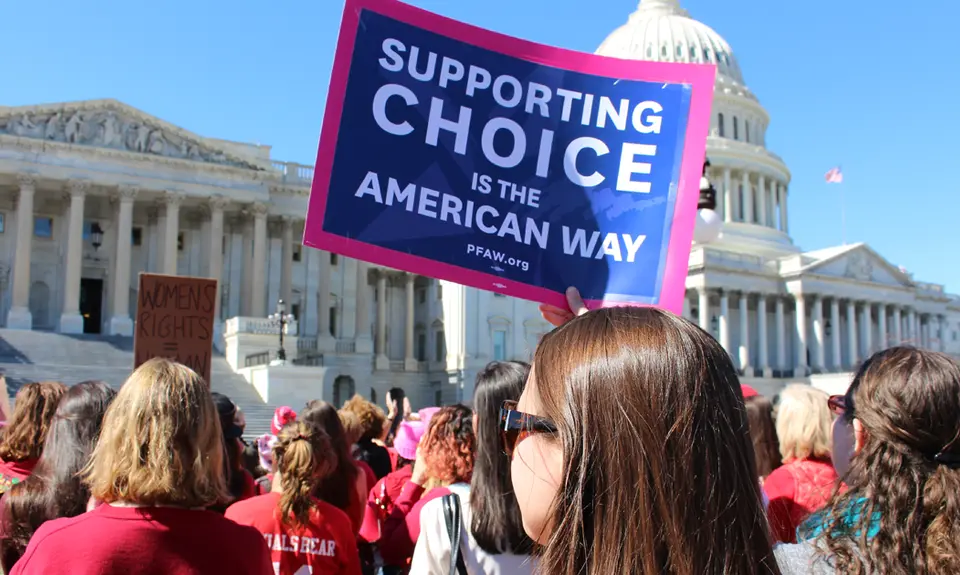“Confirmed Judges, Confirmed Fears” is a blog series documenting the harmful impact of President Trump’s judges on Americans’ rights and liberties. Cases in the series can be found by issue and by judge at this link
Trump justices Brett Kavanaugh, Neil Gorsuch and Amy Coney Barrett cast the deciding votes in an unsigned “shadow docket” 5-4 ruling, as to which even Chief Justice John Roberts dissented, that refused to block or authorize an immediate lower court hearing on the draconian Texas abortion law that bans abortions after about six weeks of pregnancy. The September 2021 decision was in Whole Woman’s Health v Jackson.
As described earlier in this blog, Texas recently passed what has been called the “nation’s strictest” abortion law, which prohibits abortion as soon as a fetal heartbeat can be detected, after about six weeks of pregnancy. The law also sets up a “bounty hunting scheme” to enforce the law, under which any person who is not a government official can file a civil lawsuit against anyone they think performed or helped someone get an abortion that violated it and, if they succeed, receive statutory damages of at least $10,000 per abortion, plus costs, attorneys’ fees, and injunctive relief. Reproductive rights groups and doctors filed a lawsuit challenging the law, and a district court hearing on a motion for a preliminary injunction against it had been scheduled for August 30, two days before the statute it to take effect.
In their own version of “shadow docket” orders, however, Trump Fifth Circuit judges Duncan and Engelhardt, joined by a very conservative George W Bush nominee, cancelled the hearing with absolutely no explanation when requested by the state, and then refused to reschedule it or consider the issue on their own. The clinics and doctors immediately went to the Supreme Court, asking that it either block the law while the litigation goes forward or allow the district court to hold a hearing on that issue.
The Court failed to act before September 1 and as predicted, the law effectively shut down the availability of almost all abortions in the state. Late on September 1, the Court issued a brief unsigned “shadow docket” order that refused to temporarily stop the Texas law. Trump justices Kavanaugh. Barrett, and Gorsuch cast deciding votes for the 5-4 order, from which even Chief Justice Roberts dissented.
In a one-paragraph opinion, the majority acknowledged that the clinics and doctors raised “serious questions” about the constitutionality of the law, but claimed that they had not “carried their [alleged] burden” on the “complex and novel antecedent procedural questions” raised by the law’s enforcement mechanism through private civil litigation rather than state enforcement. The majority indicated it was not deciding the constitutional issues or preventing “procedurally proper” claims against the law, but refused any temporary relief with respect to the harsh statute.
Chief Justice Roberts directly answered the procedural dodge used by the majority by explaining in his dissent that the proper course would have been to “grant preliminary relief” against the law while the lower courts “consider whether a state can avoid responsibility for its laws” as Texas has attempted to do. Roberts warned that Texas’ conduct could become a “model for action in other areas” that the Court should consider carefully after lower court proceedings and “full briefing and oral argument,” rather than the hasty “shadow docket” ruling chosen by his conservative colleagues.
Justices Stephen Breyer, Sonia Sotomayor, and Elena Kagan were more pointed in their dissents, emphasizing what Justice Breyer called the “imminent and serious harm” being caused by simply putting the Texas law into effect and the precedent for preliminary action by the Court. Justice Kagan noted that the decision was “emblematic” of the majority’s “shadow-docket decisionmaking – which every day becomes more unreasoned, inconsistent, and impossible to defend.” Justice Sotomayor called the ruling “stunning,” explaining that in response to a request to enjoin a “flagrantly unconstitutional law engineered to prohibit women from exercising their constitutional rights and evade judicial scrutiny,” the majority has chosen to “bury their heads in the sand.”
The future of the Texas law remains unclear. But there can be no question that the Court’s action, made possible by the three Trump justices, will severely harm women across Texas and possibly even elsewhere. The case is yet another illustration, as part of our fight for our courts, of the importance of confirming Biden federal court nominees who will seek to uphold constitutional rights for all.
